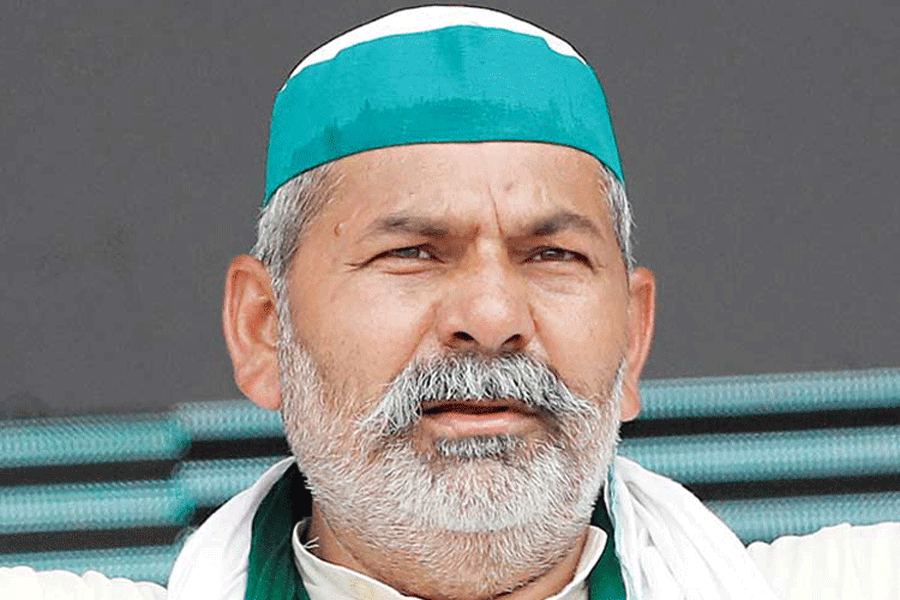Farm groups mostly based in Haryana and western Uttar Pradesh have accused the RSS and the BJP of spreading hatred for political gains and castigated the BJP government in Haryana for its alleged complicity in the communal violence that broke out in Nuh district last week.
The stand taken by the Jat leaders is considered significant because the BJP had been able to reap the gains of divisions between the community and Muslims after the riots in Muzaffarnagar in western Uttar Pradesh in 2013. At least 62 people were killed in the clashes then between Jats and Muslims.
However, the Jats and farmers of Haryana and western Uttar Pradesh have been opposing the Narendra Modi government for the past couple of years and making common cause with the Opposition. In Haryana, the Jats remain a powerful voter-cum-social lobby, which prompted deputy chief minister Dushyant Chautala to sharply question the administration on the second day of violence.
Against this backdrop, farmer leader Rakesh Tikait told a local TV channel: “The government wants to create divisions along religious lines. It is the policy of the government to ensure riots take place in the country. They are busy polarising people as they know it will help them get more votes in the coming election.”
Referring to the armed members of Hindutva groups who took part in the religious rally on the day of the violence, he said: “It is the policy of the government to ensure such violence takes place. Why are they now blaming police officers for this? It has been their policy.”
For the past two years, Tikait said, the Hindutva groups have been taking out a religious rally in the Mewat region of Nuh. “They have been doing this for the past two years because they want to create tension, knowing very well that Nuh is a minority-dominated area. A big conspiracy has been hatched by BJP to destroy the country’s social fabric by creating division along religious lines.”
He said the police were not given a free hand to crack down on rioters. “When the government wants such communal violence to take place, no one can stop this. The police do whatever they were told by their political masters. This is the government’s policy as they want to remain in power by engineering riots and they are least bothered about the country,” Tikait said.
Inderjeet Tomar, a Jat and a farmers’ group representative in Haryana, said the BJP had become desperate in Haryana because of its declining popularity. He said that in the last Assembly elections in 2019, the BJP had to depend on Dushyant Chautala’s Jannayak Janta Party to form the government.
“They have become very desperate as the incumbent chief minister, Manohar Lal Khattar, is very unpopular. The Jat community has also turned against the party for its anti-farmers’ policy and that’s why the community played an important part in the farmers’ agitation last year,” he said.
Khattar is seen as a politician with no real political roots in Haryana but he is backed by Modi.
“What we witnessed in Nuh is going to be replayed in other parts of the country in the coming months ahead of the Lok Sabha elections. The BJP knows only polarisation will bail them out in the polls as they have failed in delivering on their promises,” Tomar added.
Another farmer leader said the BJP-RSS had been trying to communalise the Mewat region, which has a substantial Muslim population, for the past few years. “They have now become desperate after the alliance of the Opposition parties and now think that only polarisation before the next year’s general election and the Assembly polls in Haryana will help them come to power.”
The farmer groups fear that the violence in Haryana, which shares its borders with states such as Delhi, Uttar Pradesh, Rajasthan and Punjab, could have ramifications in the bordering states as well.
Demolition stayed
Taking a suo moto cognisance of the “bulldozer justice” in Haryana’s Nuh following the communal violence last week, Punjab and Haryana High Court on Monday asked the government to halt the demolition drive of “illegal constructions” till further orders.
The court questioned the Haryana government’s drive without serving any notice to the affected parties.
The high court’s intervention came as the demolition drive entered its fifth day. Over the past four days, the district administration has demolished over 700 buildings, structures and shanties, mostly belonging to Muslims.
Immediately after the court’s ruling, the Nuh district authorities asked officials to stop the bulldozer action.

